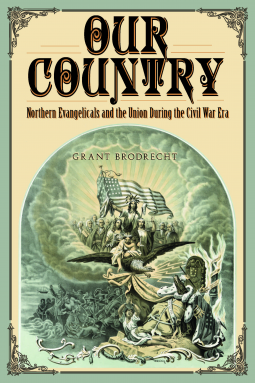
Our Country
Northern Evangelicals and the Union during the Civil War Era
by Grant R. Brodrecht
This title was previously available on NetGalley and is now archived.
Send NetGalley books directly to your Kindle or Kindle app
1
To read on a Kindle or Kindle app, please add kindle@netgalley.com as an approved email address to receive files in your Amazon account. Click here for step-by-step instructions.
2
Also find your Kindle email address within your Amazon account, and enter it here.
Pub Date Jun 05 2018 | Archive Date Apr 30 2018
Talking about this book? Use #OurCountry #NetGalley. More hashtag tips!
Description
On March 4, 1865, the day Abraham Lincoln delivered his second inaugural address, Reverend Doctor George Peck put the finishing touches on a collection of his sermons that he intended to send to the president. Although the politically moderate Peck had long opposed slavery, he, along with many other northern evangelicals, was not an abolitionist. During the Civil War he had come to support emancipation, but, like Lincoln, the conflict remained first and foremost about preserving the Union. Believing their devotion to the Union was an act of faithfulness to God first and the Founding Fathers second, Our Country explores how many northern white evangelical Protestants sacrificed racial justice on behalf of four million African-American slaves (and then ex-slaves) for the Union’s persistence and continued flourishing as a Christian nation.
By examining Civil War-era Protestantism in terms of the Union, author Grant Brodrecht adds to the understanding of northern motivation and the eventual "failure" of Reconstruction to provide a secure basis for African American's equal place in society. Complementing recent scholarship that gives primacy to the Union, Our Country contends that non-radical Protestants consistently subordinated concern for racial justice for what they perceived to be the greater good. Mainstream evangelicals did not enter Reconstruction with the primary aim of achieving racial justice. Rather they expected to see the emergence of a speedily restored, prosperous, and culturally homogenous Union, a Union strengthened by God through the defeat of secession and the removal of slavery as secession’s cause.
Brodrecht eloquently addresses this so-called “proprietary” regard for Christian America, considered within the context of crises surrounding the Union’s existence and its nature from the Civil War to the 1880s. Including sources from major Protestant denominations, the book rests on a selection of sermons, denominational newspapers and journals, autobiographies, archival personal papers of several individuals, and the published and unpublished papers of Abraham Lincoln, Andrew Johnson, and Ulysses S. Grant. The author examines these sources as they address the period’s evangelical sense of responsibility for America, while keyed to issues of national and presidential politics.
Northern evangelicals’ love of the Union arguably contributed to its preservation and the slaves’ emancipation, but in subsuming the ex-slaves to their vision for Christian America, northern evangelicals contributed to a Reconstruction that failed to ensure the ex-slaves’ full freedom and equality as Americans.
Available Editions
| EDITION | Other Format |
| ISBN | 9780823279913 |
| PRICE | $44.00 (USD) |
| PAGES | 288 |
Featured Reviews
 Zine S, Reviewer
Zine S, Reviewer
I really enjoyed this book. As a student of southern history, I was troubled that I had never been given an opportunity to study this aspect of the Civil War. The protestants played such an important part of the Union's war effort and populations encouragement. The war was lasting far longer than anyone thought and was costing so much in terms of lives and money that many were losing their will to fight. The protestant's understanding and support for the fighting of the war played such a vital role. This book does a wonderful job of revealing the actions taken by several pastors in letters and sermons.



